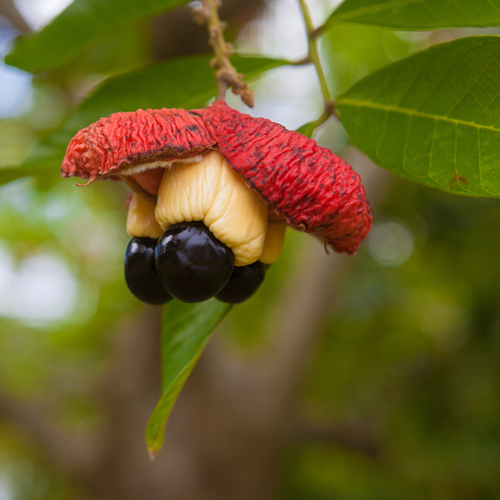
Ackee
Scientific names: Blighia sapida, Cupania sapida
Family: Sapindaceae
Alternate names: Ackée, Akee, Akée, Aki, Akí, Anjye, Arbre Fricasse, Arbre à Fricassée, Daki, Gwanja, Ishin, Isin, Jakí, Kaha, Kusa, Okpu, Ris de Veau, Seso Vegetal
Actions: Molluscicidal activity
Background
Ackee (Blighia sapida) is an evergreen tree that makes fruit. Ripe ackee fruit is commonly eaten as food in Jamaica. Unripe ackee fruit is poisonous.
The ripe ackee fruit contains fatty acids. The unripe ackee fruit contains poisonous chemicals that can cause dangerously low blood sugar, liver damage, and death. Most ackee products have been banned from import into the US due to concerns about poisoning from the unripe fruit.
People use ackee for many conditions, but there is no good scientific evidence to support any use. Eating unripe ackee fruit is unsafe.
The ripe ackee fruit contains fatty acids. The unripe ackee fruit contains poisonous chemicals that can cause dangerously low blood sugar, liver damage, and death. Most ackee products have been banned from import into the US due to concerns about poisoning from the unripe fruit.
People use ackee for many conditions, but there is no good scientific evidence to support any use. Eating unripe ackee fruit is unsafe.
Safety Safety definitions
When taken by mouth: The ripe ackee fruit is commonly eaten as a food. It's usually well-tolerated. But consuming the unripe ackee fruit is unsafe, even if it has been cooked. The unripe fruit contains poisonous chemicals that can cause dangerously low blood sugar, liver damage, severe vomiting, and death.
Children: It is unsafe for children to consume unripe ackee fruit. Children are more sensitive to the toxic effects of ackee than adults. There isn't enough reliable information to know whether the ripe fruit is safe for children to eat.
Special Precautions & Warnings:
Pregnancy and breast-feeding: Unripe ackee fruit is unsafe when consumed while pregnant or breast-feeding. There isn't enough reliable information to know if the ripe ackee fruit is safe to use when pregnant or breast-feeding. Stay on the safe side and avoid use.Children: It is unsafe for children to consume unripe ackee fruit. Children are more sensitive to the toxic effects of ackee than adults. There isn't enough reliable information to know whether the ripe fruit is safe for children to eat.
Effectiveness
Effective Effectiveness definitions
There is interest in using ackee for a number of purposes, but there isn't enough reliable information to say whether it might be helpful.
Dosing & administration
The ripe ackee fruit is commonly eaten as food in Jamaica. As medicine, there isn't enough reliable information to know what an appropriate dose of ackee might be. Keep in mind that natural products are not always necessarily safe and dosages can be important. Be sure to follow relevant directions on product labels and consult a healthcare professional before using.
The unripe ackee fruit contains poisonous chemicals and is unsafe. Avoid use.
The unripe ackee fruit contains poisonous chemicals and is unsafe. Avoid use.
Interactions with pharmaceuticals
It is not known if Ackee interacts with any medicines. Before taking Ackee, talk with your healthcare professional if you take any medications.
Interactions with herbs & supplements
There are no known interactions with herbs and supplements.
Interactions with foods
There are no known interactions with foods.
vital.ly has licensed monographs from TRC Healthcare.
This monograph was last reviewed on 30/03/2023 11:00:00 and last updated on 12/09/2014 15:37:21. Monographs are reviewed and/or updated multiple times per month and at least once per year.
Natural Medicines disclaims any responsibility related to medical consequences of using any medical product. Effort is made to ensure that the information contained in this monograph is accurate at the time it was published. Consumers and medical professionals who consult this monograph are cautioned that any medical or product related decision is the sole responsibility of the consumer and/or the health care professional. A legal License Agreement sets limitations on downloading, storing, or printing content from this Database. No reproduction of this monograph or any content from this Database is permitted without written permission from the publisher. It is unlawful to download, store, or distribute content from this site.




